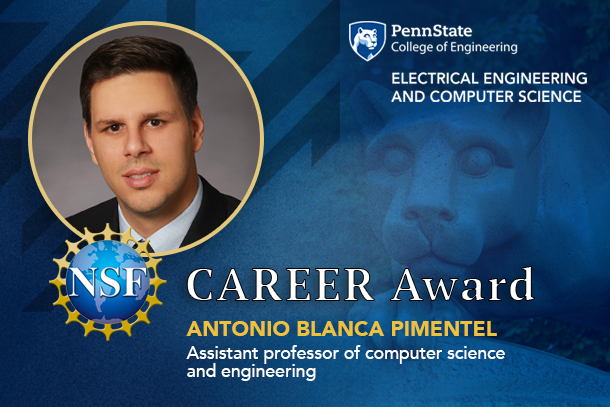
Antonio Blanca Pimentel, assistant professor of computer science and engineering at Penn State, earned a five-year, $500,000 NSF CAREER Award. Credit: Penn State.
2022 NSF CAREER Award: Antonio Blanca Pimentel
2/28/2022
UNIVERSITY PARK, Pa. — Antonio Blanca Pimentel, assistant professor of computer science and engineering at Penn State, earned a five-year, $500,000 NSF CAREER Award for a project titled “Sampling, learning and testing spin systems.”
What do you want to understand or solve through this project?
This project focuses on fundamental computational problems that emerge in the context of spin systems. Spin systems are multivariate probability distributions that provide a robust mathematical model for understanding complex systems of small interacting particles. They are used to tackle central challenges in science and engineering. The project aims to advance our theoretical understanding of the problems of sampling, learning and testing on spin systems.
A properly developed theory for these problems is well-known to improve the performance and reliability of spin models in applications. A key focus in the project, for example, is the study of Markov chain Monte Carlo (MCMC) algorithms, perhaps the most classical and popular of approaches to sampling distributions in practice. Various empirical methods and heuristics are used to certify the convergence of MCMC algorithms in practice, but these methods are unreliable and often result in biased samples, making any subsequent experimental outcome flawed. A rigorous theoretical understanding of the convergence rates of MCMC algorithms avoids the shortcomings of empirical methods.
How will advances in this area impact society?
Spin systems emerged in the study of phase transitions in statistical physics early in the 20th century and are now among the most successful probabilistic models, with applications spanning a wide range of scientific areas. They are used, for example, for image segmentation in computer vision, for phylogenetic reconstruction in computational biology, in the study of coordination in game theory, to model the spread of information in social networks and even to predict the fitness landscape of proteins in the design of HIV vaccines. Advancing the theory can improve the performance in applications that use spin system models, providing more efficient, more reliable and less biased algorithms.
Will undergraduate or graduate students contribute to this research? How?
The most ambitious research goals in the project will require substantial student contributions on all fronts, from developing new mathematical insights to fleshing out proofs or tuning the theoretical developments to applications. The training students will receive as part of this project will also be most conducive to their development as researchers. Students interested in participating should email me at ablanca@cse.psu.edu for more information
The NSF CAREER Award not only funds a research project, but it also recognizes the potential of the recipient as a researcher, educator and leader in their field. How do you hope to fulfill that potential?
The project has a vigorous integrated education plan that includes programming team activities, direct mentoring of Hispanic and Latino students and the design of a new graduate course on the MCMC method. These activities will expand my role as an educator at Penn State. On the research front, the project addresses challenging and significant research problems in the study of spin systems. Solving these problems will advance the state of the art and impact several application domains. My goal is to bring my expertise and insights and contribute to the resolution of such problems.



